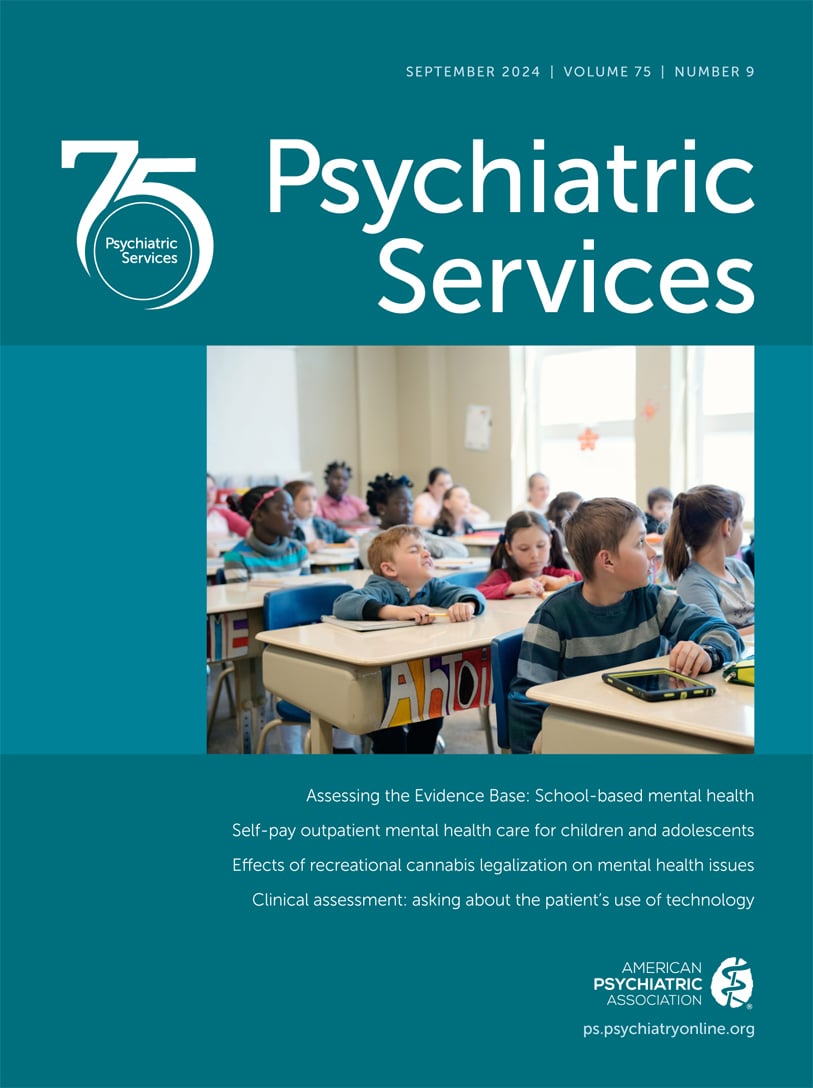Psychiatric Services
- Volume 67
- Number 6
- June 2016
This Month’s Highlights
Taking Issue
Articles
Publication date: 29 February 2016
Pages596–602Objective: Implementation of recovery-oriented practice has proven to be challenging, and little is known about the extent to which recovery-oriented principles are integrated into mental health inpatient settings. This review of the literature examined ...
https://doi.org/10.1176/appi.ps.201400469Publication date: 14 February 2016
Pages603–609Objective: Housing First is emerging as an evidence-based practice for housing and supporting people who are homeless and have a mental illness. The objective of this study was to determine whether Housing First increases the odds of obtaining competitive ...
https://doi.org/10.1176/appi.ps.201500002Publication date: 14 February 2016
Pages610–614Objective: Recovery from mental illness is possible, but individuals with co-occurring disorders and homelessness face challenges. Although a nonlinear recovery course is assumed, few studies have analyzed recovery over time. This mixed-methods study ...
https://doi.org/10.1176/appi.ps.201500126Publication date: 01 February 2016
Pages615–621Objective: Permanent supportive housing (PSH) programs are being implemented nationally and on a large scale. However, little is known about PSH for transition-age youths (ages 18 to 24). This study estimated health services costs associated with ...
https://doi.org/10.1176/appi.ps.201500200Publication date: 14 February 2016
Pages622–629Objective: Health plans play a key role in facilitating improvements in population health and may engage in activities that have an impact on access, cost, and quality of behavioral health care. Although behavioral health care is becoming more integrated ...
https://doi.org/10.1176/appi.ps.201500235Publication date: 01 February 2016
Pages630–635Objective: The authors’ objective was to determine how assisted outpatient treatment (AOT) has been implemented in actual practice in the 45 states with AOT statutes. Methods: A national survey of AOT programs was conducted to examine the extent to which AOT ...
https://doi.org/10.1176/appi.ps.201500073Publication date: 14 February 2016
Pages636–641Objective: The aim of this analysis was to determine changes in patterns of depression screening and diagnosis over three years in primary and specialty mental health care in a large health maintenance organization (HMO) as part of a project to develop ...
https://doi.org/10.1176/appi.ps.201400465Publication date: 15 April 2016
Pages642–649Objective: This study examined correlates of use of outpatient and inpatient mental health services and psychotropic medication in a large, nationally representative sample of young adults ages 18–26 with mental illness (N=22,600). Methods: Data were from ...
https://doi.org/10.1176/appi.ps.201400486Publication date: 14 February 2016
Pages650–657Objectives: The study examined the association of attitudes toward mental health help seeking and beliefs about the effectiveness of treatments with future help-seeking behavior and use of specific services in the general population. Methods: Data on ...
https://doi.org/10.1176/appi.ps.201500164Publication date: 14 February 2016
Pages658–663Objective: Clinical decision making is an important aspect of mental health care. Predictors of how patients experience decision making and whether decisions are implemented are underresearched. This study investigated the relationship between decision ...
https://doi.org/10.1176/appi.ps.201500083Brief Reports
Publication date: 04 January 2016
Pages667–670Objective: People who had a recent history of homelessness and had mental illness were studied to determine how many wished to be employed and were willing to accept supported-employment services and the factors associated with a decision to decline ...
https://doi.org/10.1176/appi.ps.201500140Publication date: 14 January 2016
Pages671–675Objective: This study examined factors associated with employment among homeless men with mental illness, particularly history of criminal justice involvement. Methods: Data from 569 homeless men in the 11-site Collaborative Initiative to Help End Chronic ...
https://doi.org/10.1176/appi.ps.201500145Publication date: 29 February 2016
Pages676–679Objective: This study examined differences in opioid agonist therapy (OAT) utilization among Medicaid-enrolled adults receiving public-sector opioid use disorder treatment in states with Medicaid coverage of methadone maintenance, states with block grant ...
https://doi.org/10.1176/appi.ps.201500228Publication date: 01 February 2016
Pages680–683Objective: Emergency departments (EDs) are often the primary contact point for suicidal individuals. The post-ED visit period is a high suicide risk time. To address the need for support during this time, a novel intervention was implemented in five ...
https://doi.org/10.1176/appi.ps.201500082Publication date: 04 January 2016
Pages684–687Objective: This study explored predictors and consequences of nonattendance of a brief, five-day partial hospital program (PHP). Methods: Patients (N=675; N=744 admissions) who did not attend every day of a PHP, with or without prior excuses, were considered ...
https://doi.org/10.1176/appi.ps.201400416Publication date: 29 February 2016
Pages688–691Objective: This study aimed to characterize rates and correlates of mental health service use, as well as barriers to care, among a sample of firefighters reporting a history of suicide ideation, plans, or attempts during their firefighting careers. Methods:...
https://doi.org/10.1176/appi.ps.201500177Publication date: 15 March 2016
Pages692–695Objective: Substance use disorders are common among persons with HIV/AIDS. This study examined the prevalence and correlates of the provision of four HIV services in a national sample of substance abuse treatment facilities. Methods: Data were from the 2011 ...
https://doi.org/10.1176/appi.ps.201500078Open Forum
Publication date: 14 March 2016
Pages664–666Residential behavioral treatment is a growing sector of the health care industry and is used by a large proportion of adolescent and adult patients with eating disorders. These programs and the organizations that own them have developed extensive ...
https://doi.org/10.1176/appi.ps.201500338Global Mental Health Reforms
Publication date: 01 February 2016
Pages588–590To describe current outpatient mental health service use and treatments in Mozambique, the authors reviewed registry entries for 2,071 outpatient psychiatric visits at the Beira Central Hospital in Sofala Province from January 2012 to September 2014. ...
https://doi.org/10.1176/appi.ps.201500508Best Practices
Publication date: 14 February 2016
Pages591–593Previous studies conducted in Maryland of the Family-to-Family (FTF) education program of the National Alliance on Mental Illness (NAMI) found that FTF reduced subjective burden and distress and improved empowerment, mental health knowledge, self-care, ...
https://doi.org/10.1176/appi.ps.201500519Personal Accounts
Frontline Reports
News & Notes
Past Issues
View Issues Archive
Vol. 75 | No. 12

Vol. 75 | No. 11

Vol. 75 | No. 10
